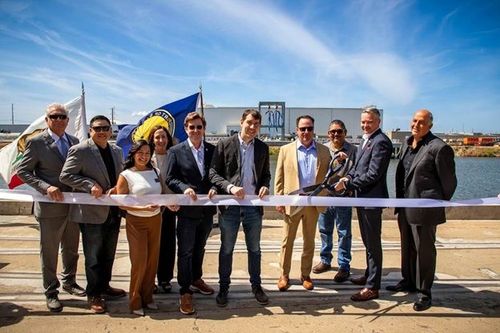BWC Terminals completes new MOTEMS-compliant dock for renewable fuels at Port of Stockton

Congressman Harder joins ceremony celebrating milestone for California’s clean fuels supply chain, expanding the company’s West Coast operations. / SOURCE: Port of Stockton
May 2, 2025
BY Port of Stockton
BWC Terminals on April 22 celebrated the official completion of its expanded renewable fuels terminal at the Port of Stockton, marking a significant milestone in strengthening California’s renewable fuels and maritime infrastructure. BWC executives, customers, and partners attended the ribbon-cutting event in addition to special guest California Congressman Josh Harder.
The state-of-the-art terminal includes the first newly constructed Marine Oil Terminal Engineering and Maintenance Standards (MOTEMS)-compliant dock built in California in nearly 30 years. It will play a vital role in advancing the renewable fuels supply chain across the state. It is designed to safely and efficiently transfer renewable diesel and biodiesel from marine vessels, supporting California’s efforts to decarbonize hard-to-electrify sectors such as heavy-duty transportation. The facility features modern safety and environmental systems, including spill containment, fire protection, seismic resilience, and upgraded vessel mooring infrastructure.
BWC has rapidly expanded its Stockton terminal by over 500% in the past five years to meet California’s growing demand for renewable fuel storage and logistics. Constructed under a Project Labor Agreement with the San Joaquin Building Trades Council, the expansion project created 30 high-quality construction jobs across nine trades. The renewable fuels terminal and new dock support 18 full-time positions at BWC’s Stockton facilities.
“At BWC, we are proud to serve as a critical link in the renewable fuels supply chain,” said Adam Smith, president and CEO of BWC Terminals. “This expanded terminal demonstrates our strong commitment to California’s clean energy future, which was made possible through the leadership and collaboration with Congressman Harder, our labor partners, and the Port of Stockton. We are honored to invest in this community and its future.”
Advertisement
Advertisement
“The Port of Stockton is a key economic engine for the Valley, helping to export our world-class crops and bringing business and jobs to our communities. We have to keep building on that leadership,” said Representative Harder. “This renewable fuels terminal will make the Port safer and more efficient while creating new jobs and supporting statewide decarbonization goals. We worked hard to bring this new infrastructure to the Port, and I look forward to continuing to fight for smart investments in our local economy’s future.”
“The BWC MOTEMS dock is a pivotal step in advancing the Port of Stockton’s commitment to sustainability and renewable energy. By providing a modern infrastructure capable of supporting renewable fuel operations, we’re helping drive the transition toward cleaner and greener fuels,” said Kirk DeJesus, Port Director for the Port of Stockton. “This new facility will not only accommodate the growing demand for low-emission fuel but also position the Port as a leader in supporting California’s ambitious climate goals and the future of sustainable shipping.”
Advertisement
Advertisement
Related Stories
Saipem has been awarded an EPC contract by Enilive for the expansion of the company’s biorefinery in Porto Marghera, near Venice. The project will boost total nameplate capacity and enable the production of SAF.
Global digital shipbuilder Incat Crowther announced on June 11 the company has been commissioned by Los Angeles operator Catalina Express to design a new low-emission, renewable diesel-powered passenger ferry.
International Air Transport Association has announced the release of the Sustainable Aviation Fuel (SAF) Matchmaker platform, to facilitate SAF procurement between airlines and SAF producers by matching requests for SAF supply with offers.
Alfanar on June 20 officially opened its new office in London, further reaffirming its continued investment in the U.K. The company is developing Lighthouse Green Fuels, a U.K.-based SAF project that is expected to be complete in 2029.
ATR and French SAF aggregator ATOBA Energy on June 19 signed a memorandum of understanding (MOU) to explore ways to facilitate and accelerate sustainable aviation fuel (SAF) adoption for ATR operators.
Upcoming Events










